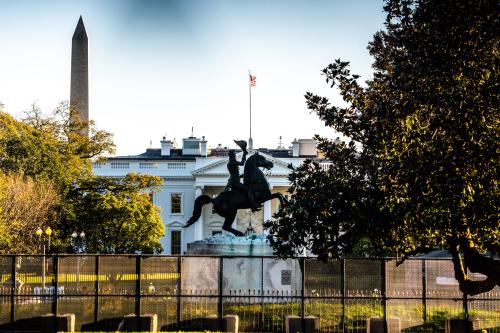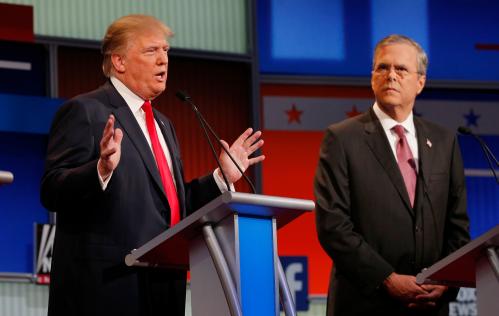“I have instructed my team to follow the example that President Bush’s team set eight years ago, and work as hard as we can to make sure that this is a successful transition for the president-elect,” Barack Obama said on the day following the 2016 presidential election. As we enter the second week since the 2020 presidential election, similar cooperation is nonexistent from the outgoing Trump administration. Instead, The Washington Post reports that Donald Trump’s White House “instructed senior government leaders to block cooperation with president-elect Joe Biden’s transition team.”
The transition between presidential administrations is an intense 11-week process. This week is the second week of that process. Almost 20% of the time allotted to organize the activities of 2.1 million federal employees and a $4.8 trillion federal budget has elapsed.
Amid an expanding pandemic that has infected over 10 million people and killed almost a quarter million Americans, presidential petulance rules. The Trump ban on cooperation, for instance, has meant that the Biden team cannot even talk to Dr. Anthony Fauci and the other experts whose input will be essential for saving lives and getting the United States back on its feet.
Fortunately, the incoming Biden team anticipated this response and prepared. Fortunately, the Biden transition has developed work arounds. Unfortunately, those efforts have proven to be necessary. The Washington Post reports, “Political appointees have told their staffers, including career civil servants, not to respond to outreach from the Biden team.”
Trump Delayed His Transition
The Trump presidential transition in 2016-17 proved that a transition delayed is a transition denied. Donald Trump reportedly told his erstwhile transition head Chris Christie that he “could leave the victory party two hours early and learn everything we need to know to run the federal government.” It was not until weeks after the election that his hastily assembled transition teams began to show up at federal agencies. The consequence of this delayed effort was that the Trump administration took months to come up to speed and, in some cases, suffered permanent damage.
It now appears as though Donald Trump is attempting to inflict the same dilapidated results on his successor by denying the transition required by law. The Presidential Transition Act establishes that the General Services Administration must issue a “letter of attainment” before appropriated funds, office space and entry into federal agencies is permitted. Thus far, the administrator of the GSA, Emily Murphy, has accepted Donald Trump’s refusal to concede that he lost the election and declined to issue such an authorization.
The landlord for the Trump hotel on Pennsylvania Avenue has thus become the vehicle by which Donald Trump keeps the nation’s business from moving forward. The failure of Donald Trump to have an effective presidential transition was a self-inflicted wound of arrogance. Hobbling the Biden administration’s ability to deal with the multiple national existential crises the Trump administration leaves behind is an act of irresponsibility. Under the guise of an election dispute Donald Trump is demonstrating his abuse of power is by no means over.
I have seen presidential transitions from both the going in and going out perspective. In 2008, as a member of the Obama-Biden transition, we went into high gear with the government agencies the day after the election. That day, we moved into our new offices with special welcome kits prepared by GSA. The Bush White House made it clear to all federal agencies that they were to cooperate with our efforts. In 2016, as Chairman of the Federal Communications Commission (FCC), we prepared before the election for the potential of a transition we hoped would never come. Immediately after the election was declared we were ready to open the doors to the designated Trump transition team and provide office space, briefings, and other information (no Trump transition effort showed up for weeks, however).
Transitions are important not only because they identify the new leadership of presidential appointees, but also because they do the basic staff work for the first 100 days of the new administration. To accomplish the latter, it is necessary to know more about the details inside agencies than is publicly available.
The media, appropriately, has focused on the national security consequences of Trump’s transition intransigence. The Trump administration’s lack of a transition, however, demonstrated that those consequences spread far beyond the defense, intelligence, and diplomatic communities.
Internet Policies
Policies surrounding the internet—a topic with its own national security consequences—were a priority of the Obama transition team. As a result of the work done during the transition the Obama administration asked Congress to authorize and fund the development of a National Broadband Plan. Because of pre-inauguration transition efforts, work on the plan started only weeks after the Obama inauguration. Its findings were unveiled about a year later, which included a chapter with a spectrum plan, as well as a detailed technical appendix.
Compare that transition planning with the lack of Trump transition planning on another internet-related matter: the need for airwaves to deliver wireless connectivity. As a result of a lack of preparation, it took the Trump administration ten months before someone was in place to oversee spectrum policies through the National Telecommunications and Information Administration (NTIA). Not only was there a personnel void, but also there was a policy void created by the absence of a Trump team using the transition to develop something everyone knew would be needed: a Trump plan for use of the airwaves. Finally, in October 2018—21 months after inauguration—the president issued an executive order giving NTIA six months to work with other agencies to develop a “Sustainable Spectrum Strategy for America’s Future.” The Trump administration will end without the release of such a plan.
There is No Pause in the Need for Leadership
The federal apparatus does not shut down as the result of an election. Nor does the government push pause while a new administration sets up shop. Farm policies, energy policies, labor policies, transportation policies and a myriad of other areas over which the federal government has responsibility do not develop by themselves. A transition delayed is a transition denied and its consequences are real for the citizens and businesses of the United States.
The Brookings Institution is committed to quality, independence, and impact.
We are supported by a diverse array of funders. In line with our values and policies, each Brookings publication represents the sole views of its author(s).











Commentary
With only 11 weeks, a transition delayed is a transition denied
November 18, 2020